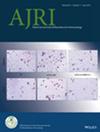IL-33 Signaling Inhibition Leads to a Preeclampsia-Like Phenotype in Pregnant Rats
Abstract
Problem
Preeclampsia (PE) is a hypertensive pregnancy disorder that is a leading cause of maternal and fetal morbidity and mortality characterized by maternal vascular dysfunction, oxidative stress, chronic immune activation, and excessive inflammation. No cure exists beyond delivery of the fetal–placental unit and the mechanisms driving pathophysiology are not fully understood. However, aberrant immune responses have been extensively characterized in clinical studies and shown to mediate PE pathophysiology in animal studies. One pathway that may mediate aberrant immune responses in PE is deficiencies in the IL-33 signaling pathway. In this study, we aim to investigate the impact of IL-33 signaling inhibition on cNK, TH17, and TReg populations, vascular function, and maternal blood pressure during pregnancy.
Method of Study
In this study, IL-33 signaling was inhibited using two different methods: intraperitoneal administration of recombinant ST2 (which acts as a decoy receptor for IL-33) and administration of a specific IL-33 neutralizing antibody. Maternal blood pressure, uterine artery resistance index, renal and placental oxidative stress, cNK, TH17, and TReg populations, various cytokines, and pre-proendothelin-1 levels were measured.
Results
IL-33 signaling inhibition increased maternal blood pressure, uterine artery resistance, placental and renal oxidative stress. IL-33 signaling inhibition also increased placental cNK and TH17 and renal TH17 cells while decreasing placental TReg populations. IL-33 neutralization increased circulating cNK and TH17s and decreased circulating TRegs in addition to increasing pre-proendothelin-1 levels.
Conclusions
Data presented in this study demonstrate a role for IL-33 signaling in controlling vascular function and maternal blood pressure during pregnancy possibly by mediating innate and adaptive immune inflammatory responses, identifying the IL-33 signaling pathway as a potential therapeutic target for managing preeclampsia.

 求助内容:
求助内容: 应助结果提醒方式:
应助结果提醒方式:


